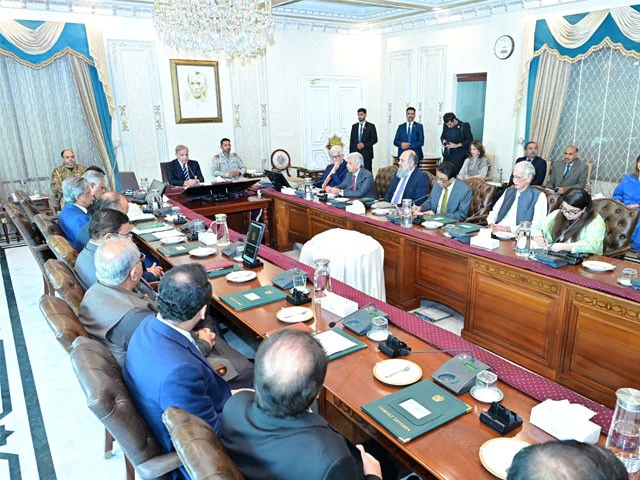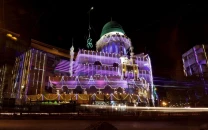Cabinet approves national AI policy, targets 1m professionals by 2030
Hajj policy for 2026, which includes 70% government quota and 30% private sector quota, also approved

The federal cabinet has approved the National Artificial Intelligence (AI) Policy for 2025, aimed at harnessing technology to drive economic growth. The policy targets training one million AI professionals, offering 3,000 annual scholarships, developing 1,000 local AI products, and launching 50,000 AI-related projects by 2030.
Chairing the cabinet meeting on Wednesday, Prime Minister Shehbaz Sharif highlighted the government’s focus on empowering youth and enhancing the economy through AI.
The policy will encourage the development of AI skills, training, and access for women and people with disabilities. The cabinet was briefed about the AI revolution expected globally by 2030, with significant financial impacts on the global economy.
The policy will include an AI Innovation Fund and AI Venture Fund to encourage private sector involvement. Steps to increase AI use in public services, cyber security, and environmental management are also covered in the policy.
Prime Minister Muhammad Shehbaz Sharif chairs federal cabinet meeting. pic.twitter.com/QZcH7oD2hG
— Government of Pakistan (@GovtofPakistan) July 30, 2025
To oversee the policy's implementation, the establishment of an AI Council and an Action Plan was approved. The cabinet also ratified decisions made in the Cabinet Committees on privatisation and legislation.
Sharif further acknowledged the damage caused by recent rains across various regions of the country, with mountainous areas suffering the most. He directed that measures be taken to address the damage caused by these natural disasters.
PM also lauded the efforts of the energy minister and his team, highlighting the successful negotiations with Independent Power Producers, which have resulted in billions of rupees in savings for the country.
براہِ راست: وزیراعظم محمد شہباز شریف کی کابینہ اجلاس میں گفتگو https://t.co/rRN8Zqvx3S
— Government of Pakistan (@GovtofPakistan) July 30, 2025
The cabinet also approved the Hajj Policy for 2026, marking significant steps towards digitising services. The PM welcomed the complete digitalisation of next year’s Hajj operation, aimed at providing the best facilities for pilgrims. “All efforts will be made to ensure the smooth provision of services to Hajj pilgrims,” he said.
The Hajj Policy 2026 includes a 70% government quota and a 30% private sector quota. It was highlighted that, following issues with the private sector in the previous year, private companies will ensure the participation of pilgrims who missed the Hajj in 2025.
A new third-party validation system for Hajj operations will be implemented for both government and private companies, ensuring transparency. The policy also includes the allocation of 1,000 seats for hardship cases and real-time monitoring of payments and processes for pilgrims opting for private companies.
Additionally, a transparent selection process for Hajj assistants will be held via a test. The government also plans to provide mobile SIM cards, digital wristbands, quality accommodations, and compensation for emergency situations. The Pakistan Hajj mobile app will be enhanced for payment, training, and complaints management.
PM Shehbaz praises Armed Forces
While addressing the meeting, PM Shehbaz also praised Pakistan's Armed Forces for their contributions to the country’s security, highlighting their triumph in the war against India, which left the world in awe of Pakistan’s military prowess.
He reflected on the sacrifices made by Pakistan's security forces, noting that their victories have earned them global recognition. “Allah has honoured the Pakistan Armed Forces,” he said, adding, “They won the war against India, and the world is still astonished by our victory, praising Pakistan for it.”
Sharif further commended the security forces for their ongoing efforts in fighting terrorism. "Our forces are making sacrifices in the fight against terrorists," he added.
PM affirms full support for state of Palestine
Shifting to international affairs, PM Shehbaz condemned the ongoing atrocities in Gaza, describing the situation as unprecedented in its severity. "The suffering witnessed in Gaza is unlike anything we have ever seen," he said, noting the widespread hunger and suffering of children.
The prime minister confirmed that aid in the form of food supplies had been sent to Gaza, coordinated by the National Disaster Management Authority, and would be dispatched via Jordan.
“The state of Palestine will have our full support in securing its rights,” he affirmed. He reiterated Pakistan's commitment to working with other countries to ensure the Palestinian people receive justice.





















COMMENTS
Comments are moderated and generally will be posted if they are on-topic and not abusive.
For more information, please see our Comments FAQ